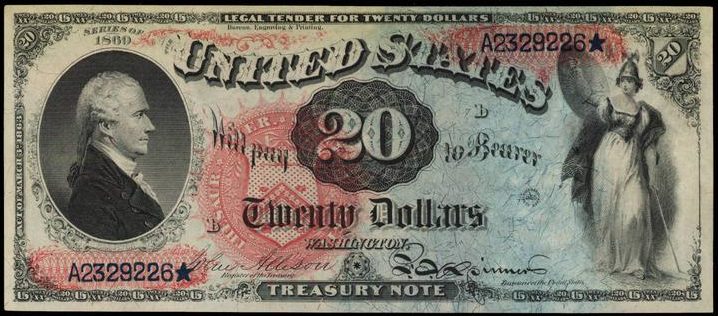Value of Twenty Dollar Bill From Series of 1869
| Year: 1869 | Type: Legal Tender / United States Note | Denomination: Twenty Dollar Bill |
| Value: The value of twenty dollar bills from 1869 is based on their condition and serial number. | ||
| We purchase $20 legal tender notes from 1869. Send us an email to tell us what you have admin@oldcurrencyvalues.com. We will respond quickly with our opinion and offer. | ||
| Description: 1869 marked the first year that the well used Alexander Hamilton and Victory design was used. Despite the availability of later years, the 1869 $20 legal tender note is quite rare and popular. It is a member of the 1869 rainbow series. Rainbow notes get their nickname because the paper they were printed on has lots of different color tones. Rainbow notes are generally available for the ten dollar denomination and lower. Starting at twenty dollars, they become expensive.
1869 $20 bills have a serial number printed in blue ink; other lower denomination rainbow notes have red serial numbers. All rainbow serial numbers end with a star symbol – but they are not replacement stars.
|
||
| Variations: All 1869 $20 notes were signed by Allison and Spinner. The condition and serial number of each note will differ, but all the notes have the same signatures and design. | ||
| Inscriptions: Act of March 3rd 1863 – Bureau Engraving & Printing – Patented July 24th 1866 – Patented Nov 24 1863 – Register Of The Treasury – Treasurer Of The United States – Legal Tender For Twenty Dollars – Series of 1869 – The United States Will Pay The Bearer Twenty Dollars Washington – Treasury Note – Amer Septent Sigil Thesaur – American Bank Note Co. New York. – This Note is a Legal Tender at its face value for all debts public and private, except duties on imports and interest on the public debt. Counterfeiting or altering this note or passing any counterfeit or alteration of it, or having in possession any false or counterfeit plate or impression of it, or any paper made in imitation of the paper on which it is printed is felony, and is punishable by $5,000 fine, or 15 years imprisonment at hard labor or both. | ||

